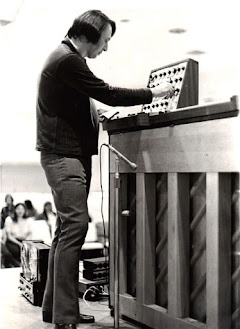Gil Mellé (31 December 1931 – 28 October 2004) was an American artist, jazz musician and film composer.
Gilbert John Mellé was born on the last day of 1931 in New York City where he was raised by a family friend after his parents abandoned him at the age of two. As a child, he began painting (he won several national painting competitions as a preteen) and playing saxophone as a teen. At age 16, Melle lied about his age to enlist in the Marines and spent some of his service time in California. Upon his discharge and return to New Jersey two years later, Melle played jazz nightly in New York, often with organist Freddie Roach and pianist Joe Manning.
At the age of 19, he was signed to Blue Note Records by label founder Alfred Lion, becoming the first white artist on the storied jazz label. He made several 10” records for Blue Note, his first being a full-length 12” LP , Patterns In Jazz, in 1956. He also served as a musical talent spotter for the label. Melle appeared at the first Newport Jazz Festival, leading a band that also contained Joe Cinderella, Vinnie Burke, and Ed Thigpen. Between 1956 and 1957 he recorded three albums for Prestige before deciding to halt his career as a traditional jazz bandleader.
Stylistically, Melle's 1950s playing on the baritone sax shares stylistic similarities with Gerry Mulligan's swinging, linear sound. But Melle tended to loiter in the instrument's middle register and was more at home on melody-less original compositions than jazz standards. Melle's works had a West Coast feel but with a more introspective and restless East Coast finish.
Apart from his musical career, Melle maintained a career as a visual artist, and at times the two intersected. His sculptures and art, beyond showing at various New York galleries, was also used in the cover design of records by Miles Davis, Thelonious Monk and Sonny Rollins, as well as several of his own records. Melle moved to Los Angeles in the 1960s and his jazz recording became sparse as he focused on painting and composing for film and television. His fascination with science and technology led him in the direction of electronic music and he began collecting, and even building his own, electronic instruments, including some of the earliest synthesizers and drum machines. In 1967, he performed with the first all-electronic jazz ensemble, The Electronauts, at the 10th Annual Monterey Jazz Festival.
He displayed his musical talent for NBC's series "Night Gallery" and then composed scores for four of the "Columbo Mystery Films" for ABC and later did the chilling score for television's "Kolchak: The Night Stalker". He also worked with major filmmakers including a young Steven Spielberg, for whom Melle scored his first two films "The Psychiatrist" and "Savage". His score for the sci-fi thriller The Andromeda Strain (1971), based on a novel by Michael Crichton, was perhaps the first electronic music score for film. With Larry Cohen, he composed a thundering score for "Bone" and next did the Sidney Poitier suspense thriller "The Organization" and ABC's motion picture "The Six Million Dollar Man".
After relocating to Los Angeles in 1969, Gil Melle After leaving television, Melle displayed his talents again for such major motion pictures including "The Manipulator", Warner Brothers' "The Ultimate Warrior" and Melle's best-known score for Universal Pictures, the 1971 science fiction thriller "The Andromeda Strain". Upon returning to television in the early eighties, he did NBC's "The Intruder Within" and later "The Case of the Hillside Stranglers", where Melle used lower-register instruments to create a chilling score.
Other films for the eighties include "Blood Beach", "The Last Chase" and "Hot Target". Melle's work has been recorded by The Toronto Symphony Orchestra, The New Zeland Symphony Orchestra, The Los Angeles Symphony and The National Philharmonic Orchestra of London. In all, he composed music for a remarkable 125 motion pictures. As a film and TV composer, Mellé was one of the first to use self-built electronic instruments, either alone or as an added voice among the string, wind, brass, and percussion sections of the orchestra
Melle returned to Blue Note with his 1991 release Mindscapes, which included ”The Blue Lion,” a musical eulogy for his life-long friend and mentor Alfred Lion. “Gil was like a beloved son to Alfred,” said Ruth Lion, Alfred's widow. “Gil Melle was a true Renaissance man, a multi-talented artist,” said current Blue Note President Bruce Lundvall, “He was one of Alfred Lion's protégés and remained a great friend of the label right up until his passing.”
In 1994, Gil Melle retired but decided to concentrate on the visual arts, in particular his computer-based digital painting, which drew great acclaim from art critics across America. He still continued his talented work in both music and art until he died from a heart attack in Malibu, California on October 28, 2004.
(Edited from IMDb, All About Jazz, Jazz Wax, Blue Note & Wikipedia)




















































